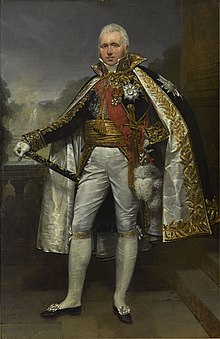Claude-Victor Perrin called Victor

Claude-Victor Perrin , called Victor , Duke of Belluno (born December 7, 1764 in Lamarche ( Vosges ), † March 1, 1841 in Paris ), was a marshal of the Empire .
Life
Coming from a humble background, Perrin joined the French artillery as a drummer ( tambour ) in Grenoble in 1781 and left after ten years. He settled in Valence as a trader , where he married Jeanne-Joséphine Muguet in 1791. From this marriage there were four children.
Following the call of the revolutionary government "The fatherland is in danger", he joined a volunteer battalion in 1792, which he commanded a year later. In 1793 he acquired the rank of Général de brigade before Toulon , where he was also wounded . Until 1795 he took part in the campaigns in Spain and Italy .
Promoted to Général de division in 1797 , Victor triumphed over the papal troops and forced the Pope to make the Peace of Tolentino . From 1798 to 1799 he served in Italy.
After the 18th Brumaire (November 9th 1799) Victor joined the First Consul and followed him again to Italy in 1800, where he fought with distinction at Montebello and Marengo . He received a saber of honor for his services at Marengo .
In July 1800, Victor joined the army of the Batavian Republic . In 1805 he went to Copenhagen as Napoleon's envoy .
In 1802 he divorced his wife and married Julie Vosch d'Avesaat the following year.
In the campaign of 1806 he fought in the battle of Jena and Auerstedt as Chief of the General Staff of the V Army Corps under Marshal Lannes . He was also wounded in this battle. On January 12, 1807, on a journey from Warsaw to Stettin , it fell into the hands of Prussian ranciers in Arnswalde and was brought to Danzig via Kolberg . Shortly thereafter exchanged for Blücher , he acquired the Marshal's Staff on June 14, 1807 as commander of the 1st Corps for his services in the Battle of Friedland .
After the Treaty of Tilsit , Napoleon I appointed him governor of Berlin . In 1808 he gave him the title of Duke of Belluno and sent him to Spain, where at the end of 1808 he took command of the 1st Army Corps and the victory of Espinosa de los Monteros , which enabled the advance on Madrid , and the victories of Uclés and Defeated Medellín (April 1809).
In contrast, Victor of Wellington was defeated in the battle of Talavera . In early 1810, Victor took part in Marshal Soult's march to Andalusia and blocked Cádiz in February , but gave up its siege in 1812 to take part in the campaign against Russia . At the head of the 9th Army Corps, on the retreat on November 17, 1812, he secured the passage of the French over the Beresina .
In 1813 Victor commanded the 2nd Corps and played a major role in the French victory near Dresden . He was also involved in the Battle of Leipzig and the Battle of Hanau . At the head of two newly formed Young Guard divisions, he was slightly wounded in the battle of Craonne (March 7, 1814). After disagreements with Napoleon I in the defense of Montereau-Fault-Yonne , he fell out of favor and had to hand over his command to Gérard . Offended in his honor, he made contact with the Bourbons .
From Louis XVIII. entrusted with the command of the 2nd military division in December 1814, Victor followed the king to Ghent after Napoleon's return from Elba . After the second restoration he became peer and chief of staff of the royal guard as well as president of the commission which had to judge the behavior of the French officers during Napoleon's Hundred Days . In this office he voted in 1815 for high treason for the execution of Marshal Ney .
In 1821 Victor was given the command of four military divisions and on December 15 of the same year the Ministry of War .
At the beginning of the Spanish campaign of 1823 , Victor gave up his ministerial office and accompanied the Duke of Angoulême as chief of staff to Spain. Through the contracts he signed with the main contractor of all military supplies, Ouvrard , he was later involved in the resulting process and lost his job on October 19, 1823.
Until the July Revolution of 1830 , Major General of the Royal Guard, Victor lived then completely withdrawn and counted with the leaders of the Legitimists .
Honors
His name is entered on the triumphal arch in Paris in the 33rd column (VICTOR).
Works
- Mémoires sur les marchés Ouvard . Paris 1826. Defense in the Ouvard case.
- Extraits de mémoires inédits de feu Claude V. Perrin, duc de Bellune . Paris 1846 (posthumously edited by his son).
Web links
Individual evidence
- ^ Meyer's Large Conversational Lexicon . 6th edition, Volume 1, Leipzig / Vienna 1905, p. 866 ( books.google.de ).
| predecessor | Office | successor |
|---|---|---|
|
Marie Victor Nicolas de Fay Alexandre, vicomte Digeon |
Minister of War of France December 14, 1821 - March 23, 1823 April 15, 1823 - October 19, 1823 |
Alexandre, vicomte Digeon Ange Hyacinthe Maxence de Damas |
| personal data | |
|---|---|
| SURNAME | Perrin called Victor, Claude-Victor |
| ALTERNATIVE NAMES | Perrin, Victor Claude; Victor |
| BRIEF DESCRIPTION | French general |
| DATE OF BIRTH | December 7, 1764 |
| PLACE OF BIRTH | Lamarche ( Vosges ) |
| DATE OF DEATH | March 1, 1841 |
| Place of death | Paris |